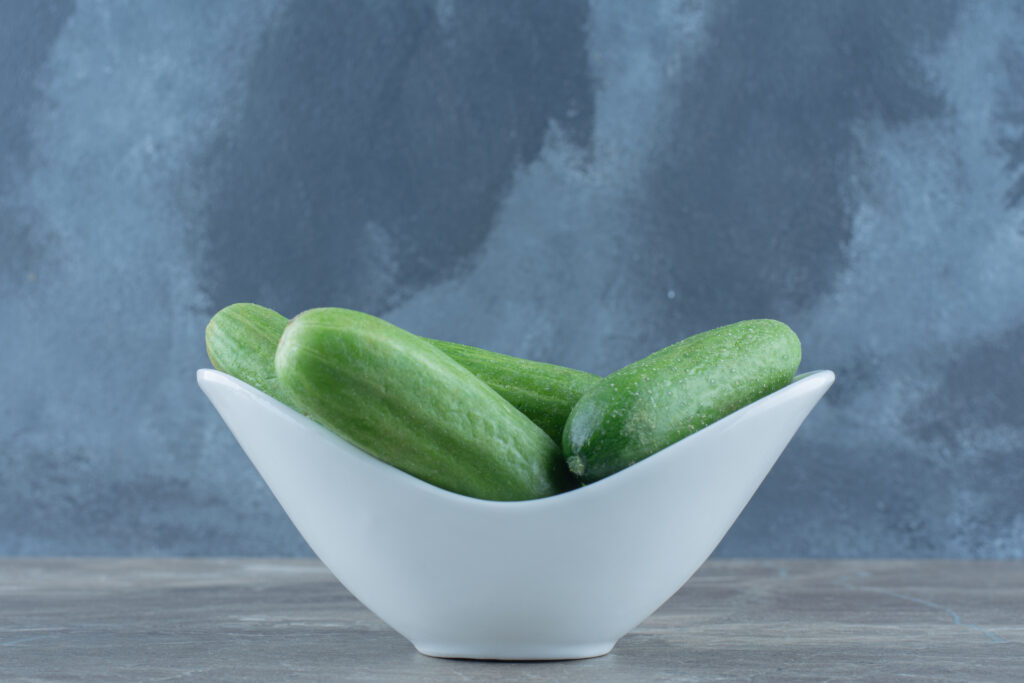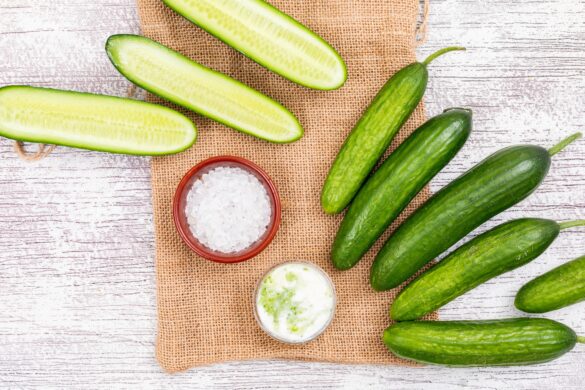Cucumbers are a staple in kitchens around the world, loved for their crisp texture, mild flavor, and refreshing bite. Whether added to salads, blended into smoothies, or simply enjoyed on their own, cucumbers offer a unique combination of hydration and nutrition. One feature that sets cucumbers apart is how remarkably low they are in calories. Often considered the perfect snack for those mindful of their diet, cucumbers provide a satisfying crunch without the guilt. But there’s more to this humble vegetable than meets the eye. Exploring cucumber calories not only opens doors to understanding their role in a healthy diet but reveals several unexpected health benefits that make this vegetable a true nutritional powerhouse.
Understanding Cucumber Calories
When it comes to calorie content, cucumbers are among the lowest-calorie vegetables you can eat. A standard serving of cucumber—about 100 grams, roughly half a medium cucumber—contains only around 15 to 16 calories. Even eating an entire medium cucumber, you’re looking at fewer than 30 calories. This extremely low energy density is due to the cucumber’s high water content, which hovers above 95%. For comparison, a similar serving of carrots contains about 41 calories, and bell peppers around 31 calories. The minimal calorie count means you can enjoy generous servings of cucumber without worrying about excess calorie intake, making them ideal for those watching their weight or looking to cut back on snacks that are high in sugar and fat.
Cucumber calories are almost negligible, but they still manage to deliver trace amounts of beneficial nutrients. You’ll find small doses of vitamin K, vitamin C, magnesium, and potassium in every serving. Because cucumbers are so low in calories, they can be enjoyed liberally in meals and snacks alike, supporting a feeling of fullness and satisfaction without tipping the calorie scale.
Hydration Powerhouse
Among the most impressive features of cucumbers is their hydrating ability. With over 95% water by weight, cucumbers rank as one of the most hydrating foods you can eat. Proper hydration is essential for nearly every function in the human body, from maintaining temperature and delivering nutrients to energizing muscles and supporting healthy skin. Dehydration, even at mild levels, can lead to fatigue, headaches, and a drop in concentration. By including cucumbers in your daily meals, you’re helping your body stay hydrated, especially on hot days or after physical activity.
This high water content is also why cucumber calories stay so low. Water adds bulk and volume without contributing energy, which means you can fill your plate—and your stomach—without racking up calories. The hydrating power of cucumbers also translates into benefits for your skin, as water-rich foods support a healthy complexion and may help reduce puffiness. For those who struggle to drink enough water throughout the day, cucumbers are a delicious way to increase hydration without even thinking about it.

Supports Weight Management
Cucumber calories play a vital role in helping manage weight. Foods that are high in water and fiber, but low in calories, are known to increase feelings of fullness and reduce overall calorie intake. Cucumbers check all these boxes. The fiber, found mainly in the skin, slows digestion and helps you feel satisfied after eating. This can be especially helpful if you’re prone to snacking between meals or looking for healthier alternatives to processed foods.
Snacking on cucumber slices or adding them to salads can keep hunger at bay without adding significant calories to your daily total. Because they are so light on calories, cucumbers can be enjoyed in large portions, making them perfect for volumetric eating—a strategy that focuses on eating foods that fill you up for fewer calories. This approach can make it easier to maintain a calorie deficit for weight loss, while still feeling satiated and comfortable. For those who prefer crunchy snacks, cucumbers are a wonderful replacement for chips or crackers, offering a similar texture but with a fraction of the calories.
Rich in Antioxidants
While cucumber calories are low, the nutritional value goes far beyond just energy content. Cucumbers are packed with antioxidants, including vitamin C, beta carotene, flavonoids, and tannins. Antioxidants are compounds that fight free radicals—unstable molecules that can damage your cells and contribute to aging and disease. Consuming antioxidant-rich foods can help reduce inflammation and lower the risk of chronic illnesses, such as heart disease, diabetes, and certain types of cancer.
What’s unique about cucumbers is that their antioxidants are found throughout the vegetable but are particularly concentrated in the skin. Eating unpeeled cucumbers ensures you’re getting the most benefit. Some studies have shown that the antioxidants in cucumbers can help protect the body from oxidative stress, supporting cellular health and boosting the immune system. Including cucumbers as part of a varied diet is an easy way to enhance your daily intake of these protective compounds.
Promotes Healthy Digestion
Digestive health is a cornerstone of overall well-being, and cucumbers offer several advantages in this area. Despite their low calorie count, cucumbers are a good source of both soluble and insoluble fiber, particularly when eaten with the skin. Fiber is essential for maintaining regularity and supporting a healthy gut microbiome. The water content in cucumbers also helps soften stool and prevent constipation, making them a gentle yet effective aid for digestive comfort.
Many people struggle to get enough fiber in their diets, which can lead to digestive issues and discomfort. By regularly including cucumbers in your meals, you’re supporting your digestive system in a natural and enjoyable way. Their mild flavor makes cucumbers easy to pair with other fiber-rich foods like leafy greens, tomatoes, and whole grains for a gut-friendly boost. Cucumber calories may be low, but their contribution to digestive wellness is significant.
Supports Heart Health
Another surprising benefit tied to cucumber calories is their impact on heart health. Cucumbers contain important minerals like potassium and magnesium, which are essential for maintaining healthy blood pressure levels. Potassium, in particular, helps balance sodium in the body, reducing tension in blood vessel walls and lowering the risk of hypertension.
Studies suggest that diets rich in fruits and vegetables—especially those high in water and low in calories—are associated with better heart health and a reduced risk of cardiovascular disease. Cucumbers, with their combination of low calorie content and beneficial nutrients, fit this profile perfectly. The fiber in cucumbers also plays a role in reducing cholesterol levels and promoting overall cardiovascular wellness. Making cucumbers a regular part of your diet can be a simple yet effective step towards a healthier heart.
Tips for Adding More Cucumbers to Your Diet
Incorporating more cucumbers into your daily routine is both easy and enjoyable. Their mild taste and crunchy texture pair well with a variety of dishes. Try adding thinly sliced cucumbers to sandwiches and wraps for extra crunch, or mix diced cucumbers into salads for a burst of freshness. Cucumber slices can also be used as a base for healthy dips like hummus or tzatziki, replacing high-calorie crackers or chips.
For a refreshing twist, try infusing your water with cucumber slices and a sprig of mint. This not only adds flavor but also encourages you to drink more water throughout the day. Cucumbers can also be blended into smoothies for added hydration or spiralized into noodles as a low-calorie alternative to pasta. When shopping, look for firm, bright green cucumbers, and store them in the refrigerator to maintain freshness.
How Many Calories Are in a Cucumber?
A medium-sized cucumber (about 150 grams) contains only 16 to 18 calories.
- Per 100 grams: About 12–15 calories.
- With skin: Slightly more fiber, but calories remain low.
Why So Few Calories?
Cucumbers are about 95% water, which means they’re naturally low in calories and carbohydrates. This makes them one of the best foods for hydration and weight management.
2. Is Cucumber Good for Weight Loss?
Yes, cucumbers are excellent for weight loss. Here’s why:
- Low in Calories: You can eat a lot without consuming too many calories.
- High in Water: Keeps you hydrated and helps flush out toxins.
- Rich in Fiber: Especially in the skin, which aids digestion and keeps you feeling full.
How to Use Cucumbers for Weight Loss
- Add slices to salads or sandwiches.
- Enjoy cucumber sticks with hummus or Greek yogurt.
- Infuse water with cucumber slices for a refreshing, calorie-free drink.
3. Does Eating Cucumber Make You Feel Full?
Cucumbers can help you feel satisfied due to their high water and fiber content.
- Water: Helps bulk up your meals and promotes a sense of fullness.
- Fiber: Slows down digestion, helping you avoid overeating.
Pro Tip:
Eat cucumbers before meals to naturally reduce your appetite.
4. Is Cucumber Safe for Diabetics?
Cucumbers are a great choice for people with diabetes.
- Very Low Sugar: Cucumbers contain less than 2 grams of sugar per 100 grams.
- Low Glycemic Index: Won’t spike blood sugar levels.
Additional Benefits for Diabetics
- Hydration: Helps manage blood sugar by preventing dehydration.
- Nutrient Support: Provides vitamins and minerals without extra carbs.
5. What Are the Other Health Benefits of Cucumber?
Cucumbers aren’t just about calories—they’re a powerhouse of nutrients!
Key Nutrients in Cucumbers
- Vitamin K: Important for bone health and blood clotting.
- Vitamin C: Boosts your immune system and helps your skin glow.
- Potassium: Supports heart health and helps regulate blood pressure.
- Antioxidants: Such as flavonoids and tannins, which protect cells from damage.
Other Benefits:
- Supports Digestion: Thanks to fiber and water.
- Refreshes Skin: Cucumber slices are often used to soothe puffy eyes or irritated skin.
- Reduces Inflammation: Antioxidants in cucumbers help combat inflammation.
6. Should You Eat Cucumber With the Peel?
Absolutely—if you can!
- The skin contains extra fiber and antioxidants.
- Wash thoroughly to remove any pesticides or wax, or choose organic when possible.
When to Peel?
- If the skin is tough, bitter, or waxed, you may want to peel it.
Frequently Asked Questions
Are cucumber skins edible?
Yes, cucumber skins are perfectly edible and actually contain a significant portion of the vegetable’s fiber and antioxidants. If you’re concerned about pesticides, choose organic cucumbers or wash them thoroughly before eating.
Can eating too many cucumbers be harmful?
Cucumbers are very safe for most people, even in large amounts. However, eating extremely large quantities could potentially cause digestive discomfort due to their high water and fiber content. Moderation is always key.
What is the best way to enjoy cucumbers for maximum nutrition?
Eating cucumbers raw and with the skin on is the best way to maximize nutrient and fiber intake. Pairing them with healthy fats, like a drizzle of olive oil, can also help your body absorb fat-soluble vitamins.
Are cucumbers good for people with diabetes?
Cucumbers are an excellent choice for people with diabetes or those watching their blood sugar. Their low carbohydrate and calorie content help prevent spikes in blood sugar, making them a safe addition to most meal plans.
How do cucumber calories compare to other snacks?
Cucumber calories are much lower than most traditional snacks like chips, crackers, or sweets. Replacing high-calorie snacks with cucumbers can help with weight management and support better overall nutrition.
Conclusion
Cucumber calories are impressively low, but their benefits extend far beyond being diet-friendly. From keeping you hydrated to supporting heart health, cucumbers are a smart addition to any meal plan. Their combination of water, fiber, and antioxidants makes them an ideal choice for anyone seeking a healthier lifestyle. So next time you’re looking for a snack, reach for a cucumber—your body will thank you.
